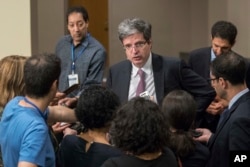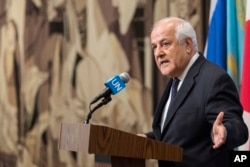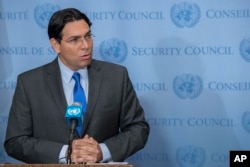The United Nations' envoy for the Middle East peace process is urging a quick resolution to the current crisis around the Al-Aqsa mosque, also known as the Temple Mount, in Jerusalem.
"It is extremely important that a solution to the current crisis be found by Friday this week," envoy Nickolay Mladenov told reporters following closed-door discussions with U.N. Security Council members. "I think the dangers on the ground will escalate if we go through another cycle of Friday prayer without a resolution to this current crisis."
Mladenov said it is "critically important" the status quo that has been in place in Jerusalem since 1967 be preserved, and he urged Israelis and Palestinians to refrain from provocative acts and show restraint.
Later Monday, the Israeli security cabinet decided to stop the use of metal detectors at a highly sensitive Jerusalem holy site. Israeli authorities decided to heed "the recommendation of all the security bodies to change the inspection with metal detectors to a security inspection based on advanced technologies and other means," according to a statement from Prime Minister Benjamin Netanyahu's office.
Tensions have risen over the past few weeks between Israelis and Palestinians after Israel installed metal detectors and security cameras at the holy site after two Israeli policemen were shot to death there by three Palestinian worshippers. Palestinians have rejected the measures as a humiliation to Muslims, increasing tensions over who controls the contested compound.
Events could have 'catastrophic costs'
On July 21, three Palestinian youths were killed in clashes with Israeli security forces following midday prayers. Later that night, a Palestinian teenager fatally stabbed three members of an Israeli settler family in their West Bank home, in apparent retaliation.
"Jerusalem is perhaps one of the most critical cities in the world," Mladenov said. "It is an emotionally, religiously and historically charged place for billions of people worldwide."
Mladenov said he asked council members to use their influence with all sides to encourage a de-escalation of tensions. The U.N. envoy said perceptions that the events of the past few weeks are "localized" are wrong, and that they have the potential "to have catastrophic costs" beyond Jerusalem and the region.
France calls for talks
France, along with council members Sweden and Egypt, called for Monday's private discussions after the increase in violence since Friday.
"We are calling on all parties to refrain from any act or statement that could exacerbate tensions and to work toward easing the situation," France's U.N. ambassador, Francois Delattre, told reporters.
Palestinian envoy Riyad Mansour told reporters that the recently installed security measures at the holy site must be removed.
"We want all obstacles put in place to deprive worshippers of exercising their right to go and pray, all these including metal detectors, cameras, obstacles, all of them, they need to be removed, completely and without conditions," he said.
Different views on attack
When asked, Mansour would not condemn the Friday attack on the settler family, saying that many Israeli settlers carry weapons, attack Palestinians, steal their land and destroy their crops, making their lives miserable.
"If people think the Palestinians are going to live that situation without any form of resistance to it, that is not realistic and that is not fair," Mansour said. "Violence is by the Israeli occupying authority: It has the tanks, it has the weapons, it has the army."
Israel's U.N. envoy, Danny Danon, expressed his government's outrage over the attack on the settler family and showed reporters a photo of the family's blood-smeared dining room.
"We do not need more carefully worded statements asking for calm," Danon said of the Security Council. "The council must demand real action by [Palestinian leader Mahmoud] Abbas — make him stop his tacit support for terror, force him to end this unbearable wave of violence, and make him do so immediately, before the lives of more innocent victims are lost."







